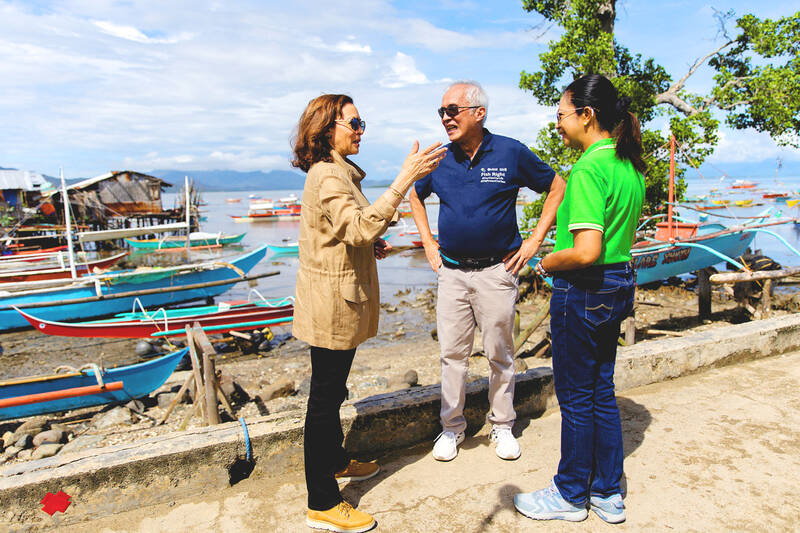US Vice President Kamala Harris yesterday visited a Philippine island near waters claimed by Taiwan and China to show support for the longtime US ally and counter Beijing’s growing influence in the region.
Harris is the highest-ranking US official ever to visit the western island of Palawan, the closest Philippine landmass to the Spratly Islands (Nansha Islands, 南沙群島) in the hotly contested South China Sea.
Beijing claims sovereignty over almost the entire sea and has ignored an international court ruling that its claims have no legal basis. Taiwan, the Philippines, Brunei, Malaysia and Vietnam have overlapping claims to parts of it.

Photo: Reuters
Harris met with fishers in a coastal village and members of the Philippine Coast Guard.
In a speech, she said that “international rules and norms” must be upheld and the UN-backed tribunal decision rejecting China’s claims over the South China Sea respected.
“The United States — and the broader international community — have a profound stake in the future of this region,” Harris said, on board a Philippine Coast Guard vessel.
“As an ally, the United States stands with the Philippines in the face of intimidation and coercion in the South China Sea,” she said.
Harris’s trip to Palawan comes a day after she held talks with Philippine President Ferdinand Marcos in Manila.
She reaffirmed the US’ “unwavering” commitment to defending the Philippines if its vessels or aircraft were attacked in the South China Sea.
Washington has a decades-old security alliance with the Philippines that includes a mutual defense treaty and a 2014 pact, known as the Enhanced Defense Cooperation Agreement (EDCA), which allows for the US military to store defense equipment and supplies on five Philippine bases.
It also allows US troops to rotate through those military bases.
Harris’s visit conveyed a “stronger sense of commitment” to the Philippines’ position on maritime claims, but also underscored the need for the EDCA’s continued implementation, said Jay Batongbacal, director of the University of the Philippines’ Institute for Maritime Affairs and Law of the Sea.
“The US cannot adequately carry out its obligations if it is forced to stay several thousand kilometers away in Japan or Guam,” he said.
Of all the claimants to the South China Sea, Beijing has in the past few years pressed its stance the most aggressively. Hundreds of Chinese coast guard and maritime militia vessels prowl the waters, swarming reefs, harassing and attacking fishing and other boats, and interfering in oil and gas exploration, as well as scientific research.
China’s Global Times yesterday accused Harris of “fanning the flames of the South China Sea issue” in an editorial.
“The Philippines has the right to receive any foreign visitor. What we want to emphasize is that any bilateral exchanges should not be at the expense of the interests of any third country as well as regional peace and stability,” it said.

Philippine President Ferdinand Marcos Jr has fired his national police chief, who gained attention for leading the separate arrests of former Philippine president Rodrigo Duterte on orders of the International Criminal Court and televangelist Apollo Carreon Quiboloy, who is on the FBI’s most-wanted list for alleged child sex trafficking. Philippine Executive Secretary Lucas Bersamin did not cite a reason for the removal of General Nicolas Torre as head of the 232,000-member national police force, a position he was appointed to by Marcos in May and which he would have held until 2027. He was replaced by another senior police general, Jose

STILL AFLOAT: Satellite images show that a Chinese ship damaged in a collision earlier this month was under repair on Hainan, but Beijing has not commented on the incident Australia, Canada and the Philippines on Wednesday deployed three warships and aircraft for drills against simulated aerial threats off a disputed South China Sea shoal where Chinese forces have used risky maneuvers to try to drive away Manila’s aircraft and ships. The Philippine military said the naval drills east of Scarborough Shoal (Huangyan Island, 黃岩島) were concluded safely, and it did not mention any encounter with China’s coast guard, navy or suspected militia ships, which have been closely guarding the uninhabited fishing atoll off northwestern Philippines for years. Chinese officials did not immediately issue any comment on the naval drills, but they

POWER CONFLICT: The US president threatened to deploy National Guards in Baltimore. US media reports said he is also planning to station troops in Chicago US President Donald Trump on Sunday threatened to deploy National Guard troops to yet another Democratic stronghold, the Maryland city of Baltimore, as he seeks to expand his crackdown on crime and immigration. The Republican’s latest online rant about an “out of control, crime-ridden” city comes as Democratic state leaders — including Maryland Governor Wes Moore — line up to berate Trump on a high-profile political stage. Trump this month deployed the National Guard to the streets of Washington, in a widely criticized show of force the president said amounts to a federal takeover of US capital policing. The Guard began carrying

Ukrainian drone attacks overnight on several Russian power and energy facilities forced capacity reduction at the Kursk Nuclear Power Plant and set a fuel export terminal in Ust-Luga on fire, Russian officials said yesterday. A drone attack on the Kursk nuclear plant, not far from the border with Ukraine, damaged an auxiliary transformer and led to 50 percent reduction in the operating capacity at unit three of the plant, the plant’s press service said. There were no injuries and a fire sparked by the attack was promptly extinguished, the plant said. Radiation levels at the site and in the surrounding